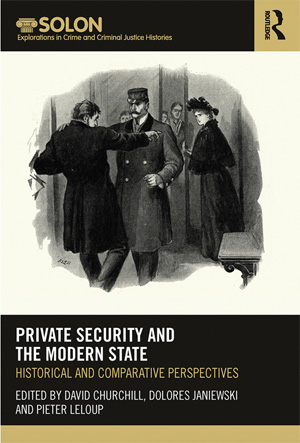Author: Editors: David Churchill, Dolores Janiewski and Pieter Leloup
ISBN No: 9780367183493
Review date: 19/04/2024
No of pages: 270
Publisher: Routledge
Year of publication: 27/07/2020
Brief:
In 1984, George Orwell famously wrote that whoever controls the present controls the past; whoever controls the past controls the future. If we apply that to private security, it may well be well placed in the present, and can feel that the tide of history is going its way for the foreseeable future; but what of its past? If historians or anyone chronicles it at all, it’s night-watchmen around braziers, security guards with heavy torches or dogs. Not much value added, not even very visible to society.
Private security can get by without a history, but an important collection of essays from across the English-speaking world shows that private security has got much more of a history than it might think.
Detective agencies, insurance companies, moral campaigners, employers’ associations, paramilitaries, self-defence, vigilantes – all have their place in Private Security and the Modern State, edited by three academics, including a Brit, Dr David Churchill of the University of Leeds. He’s the author of a rare and thorough study of physical security in the Victorian era, and who’s (for example through the archives of Corps Security, as featured in the July 2020 print edition of Professional Security magazine) looking to extend that study into the 20th century and near to the present day.
As the varied essays show, private security people and products were in demand and supplying solutions to prevent crime and the fear of crime, long before what we can call the modern age of burglar alarms and ever more sophisticated tech. The common belief – if private security in the past is given any credit at all by historians – is that the public police held sway, only for since about 1960 or thereabouts private security to rise, for various reasons, just as the private sector rowed back against the welfare state generally.
These essays offer a detailed corrective to that narrative. All along private security was at work, alongside public officials, courts, investigatory agencies and law-makers. It’s generally assumed, and has the backing of such famous scholars as the social scientist Max Weber, that the state had to have the monopoly of legitimate use of physical force; or else they risked going under to bandits, barons, bolsheviks or whoever. Not so, the editors point out in their concluding remarks; ‘none of the modern states surveyed here monopolised the use of force within their borders’. Depending on context – as hinted at in the book’s usb-title; depending on a country and its past, a time and a place might have ‘various clusters of private power and authority’.
The British academic Adam White shows that British civil servants and police chief constables sought to shut out the burgeoning contract guarding firms of post-1945 Britain – fearing they would ‘debase the sovereign currency of the public police’ – while police and civil servants developed closer working relations with other sectors of the security industry, namely burglar alarms. Here Adam White is reprising his important and path-breaking 2010 book, The Politics of Private Security, about the decades before the eventual 2001 Private Security Industry Act, that led to the UK regulator the SIA.
Likewise, David Churchill’s chapter on crime prevention in mid-Victorian Britain can be seen as a digest of his book, Crime Control, that charts the relations between ‘private security, public policing and individual precaution’. Here, then, is the point of such collections as this; you get a flavour of several scholars’ work, for the price of one book, rather than having to shell out on half a dozen or more full-length works. The editors do editing for you, so you only have to read what’s most important.
Inevitably, the chapters that you find most interesting or useful depends on you. Some topics may be of more intrinsic interest than others; if you practice martial arts, you may not know that they ‘became solidly established as one of the principal forms of unarmed self-defence against criminal victimisation in both Britain and the USA’ a century ago, as set out in Francis Dodsworth’s chapter, on ‘Selling self-defence’.
Who is not intrigued by the United States’ pioneering Pinkerton National Detective Agency? Stephen Robertson sets out how for six decades from the 1870s, such agencies were a ‘de facto national police force’ in the US, until the Federal Bureau of Investigation (FBI) from 1935. He goes through the paperwork at the Library of Congress, ‘the documentary record of personal surveillance by private detectives’. As that suggests, if private security people and the sector lack a history, it’s not for want of evidence; it’s just that historians have overlooked it. Collections such as this are a most welcome start to redress that.










